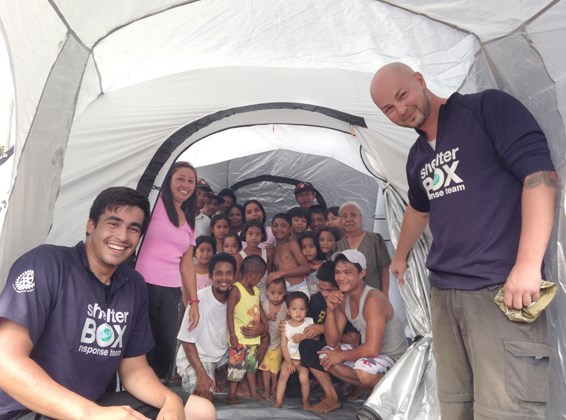The devastation in the Philippines is overwhelming, according to a West Vancouver man who has just returned from helping communities devastated by Typhoon Haiyan.
Richard Loat arrived in the Philippines approximately two weeks after the disaster left millions displaced and thousands dead.
"Nothing you read or see on television can prepare you for it," he said. "There's just so much that isn't there."
Loat volunteers with Shelterbox, an NGO that distributes boxes with blankets, tools, gifts for children and a tent designed to withstand extreme weather conditions.
"We're giving people the tools to help rebuild their lives," Loat said.
He's a veteran volunteer who has been deployed to various countries, including Sudan, over the last three years, but he was still shocked by the devastation in the Philippines.
"There was such a high casualty count that there wasn't enough space to bury people," he said. "Any green space, like a school yard or a median between two lanes on a road, was all dug up, and there were impromptu graves created."
As he travelled closer to Tacloban, the devastation became harder to digest, he said. "The place gets more and more levelled," he said. "There's nothing left standing."
"It's total destruction to the point that you can't actually comprehend how they're going to get over it, which is scary," he said.
One sign that sticks out in his mind read: "Roofless, homeless, but not hopeless."
"These people are so resilient," he said.
Loat mostly helped people who were at the southern end of the affected area on Leyte Island.
They were the first aid workers to show up in some places, he said.
His team worked closely with the local government to distribute aid and help set up tents.
"We wanted to disrupt people's way of life as little as possible," he said. "So we try to put their tent on a plot of land where their home used to be. It helps them rebuild their lives a little bit faster."
However, in some places, this was impossible because of too much debris, he said. Aid workers had to clear sites and create camps of 50 to 60 tents, he said.
His team was forced to stay almost two hours away from the city where they were working, which meant they had to wake up at 5:30 a.m., he said.
He continued to run his own charity, Five Hole for Food, at an Internet café whenever he could. "I spent my evenings and weekends trying to keep both worlds going," he said.
At the end of his threeweek stint, Loat started to struggle with compassion fatigue.
"There was nowhere to decompress," he said.
"You're immersed in this environment where everyone is needy, and it becomes hard to decide on any sort of emotional base what you want to do," he said. "You have one tent to give out, and you have two families that need it. One family might have six kids under the age of seven, and another family might have a couple of young children with disabilities, and two seniors."
"How can you even begin to evaluate that situation?" he asked. "It's a very real thing."
Volunteering in a disaster zone isn't for everyone, he said. He had to undergo a rigorous training process, including a written application, personal interview and mini-boot camps before becoming a volunteer with the organization.
"The training is very good at preparing you to handle a situation when you're running in and everyone else is running out," he said. "They do an excellent job of simulating the conditions in the field."
The global response team for Shelterbox includes approximately 250 members from 29 countries, Loat said.
Although Leyte Island is starting to recover because of plenty of aid, other communities are still neglected, he said.
"The situation is still all over the place," he said.



